#like a lindworm prince
Explore tagged Tumblr posts
Text
R’n’R at the end of NPMD

#nerdy prudes must die#Richie and Ruth should be called rnr from now on#it means something about relaxing I think#no clue#it’s like m&m in helluva boss#picture is from OSP’s Prince Lindworm video#my favourite trans analogy in mythology so far#ruth fleming#richie lipschitz#lautski
50 notes
·
View notes
Text










"A bride for me before a bride for you."
#my art#lindworm box#shadow box#the lindworm prince#sheesh#old homework made while i was learning that shading wasnt the enemy#idk i still like it the forest feels good#and im still very proud of the eldest princes coils#so slithery#this thing is a pain to photograph tho
8 notes
·
View notes
Text
My actual favorite fairytales are ones having to do with curses, getting turned into a beast, or accidentally/willingly/any-reason-ly marrying a beast or demon or monster. Prince Lindworm is one of my most favorite-est favorites. I had a pet corn snake at one point who I called Prince Lindworm (his real name was Slinky though). Other faves off the top of my head are East of The Sun, West of The Moon, The Demon in The Tree, and Featherflight.
#I also like deal with the devil/the devil and X stories a lot!#and any tale involving any type of curse or hex or geass#and I know it's silly but I do sort-of covet lesser-known fairytales and details from specific tellings.#also jsyk I don't care What the tale actually says in my mindpalace Featherflight is a giant just like her dad.#this same interest causes me to like Urusei Yatsura btw. it's so the same.#OH the tags are all a mess now but I ALSO WANTED TO SAY I recently found out that in different tellings of The Demon in The Tree people wil#change the type of food/offering given to the demon! which is obvious in retrospect but I didn't realize! I had only heard the version wher#you give the demon jam! and so that is my favorite version and the way I tell it too LOL. I love the idea of everyone intrinsically knowing#that demons just love jam#but anyway there are other variants where they give the demon different offerings as well! I can easily imagine asking the kids in the room#what it is that demon's love the most. and then whatever the kids pick is what the couple will offer the demon in that particular telling.#also yes duh yeah I like beauty and the beast! it's not really my favoritest. I like Prince Lindworm or Snow White Rose Red way more.#but there r some variants of beauty and the best that I like more than others. I am picky about it. which ultimately means I like it.
9 notes
·
View notes
Text
I am so fr touchstarved has heightened my appreciation for art
#me going thru old ass paintings to relate to touchstarved to horror art appreciation to#appreciation for old ass paintings in general pipeline#i mean i could appreciate van gogh and leyendecker even before but now im looking thru like anyone in the past like old art slap so hard#the fucking detail duudeeeeee#redstrewn talks#ok thats all visual i been talking abt but what abt me going thru book quotes and web weaving online like touchstarved has brainwormed me#into enjoying cool shit that i didnt have motivation to get into before#ME SPARKSNOTESING SHIT LIKE MACBETH AND OTHELLO AND BLUEBEARD AND PRINCE LINDWORM AND LOOKING UP HEROINES JOURNEY#AND ATU 425#ME GOING THRU PHILOSOPHY AND PSYCHOLOGY BOOK QUOTES TO RELATE TO THE BLORBOS#also MUSIC????? IVE LEGIT DISCOVERED MORE THAN LIKE A 20 HOURS OF MUSIC IN THE ENDEAVOR OF MAKING PLAYLISTS FOR THE BLORBOS#AND I GOT INTO ROCK/METAL BECAUSE OF THEM#I ALWAYS ONLY LISTENED TO ONLY POP/ELECTRONIC/JAZZ BEFOFR BUT NOW I LISTEN TO ROCK AND METAL
17 notes
·
View notes
Text
I got the book of fairy tales I ordered. Turns out it was the WRONG BOOK.
#turns out east of the sun and west of the moon with other norwegian folk tales#is not east of the sun and west of the moon old tales from the north#which#is fully my bad#though looking back at the amazon listing those things it listed under the same book (like hardcover and paperback and stuff) were not even#the same book#and the reviews were for any of the things so its like#wow I don't know if any of this stuff applied to the product I got#so yeah anyway I don't own Prince Lindworm in a physical book#YET
0 notes
Text
if tumblr was for dragons it would be called tumblair. is this anything.
0 notes
~
🦎 hatchlingshoard Follow
been thinking about getting other stuff besides gems for my lair. maybe animal bones?
5 notes
🐉 sowingdragonsteeth Follow
humans will claim they’re allies and then support knights
1,053 notes
🐍 laidlyworm Follow
hey I won’t be posting to tumblair for a while, have to look for a new home. my dad found out about my cursed transformation and kicked me out.
🐍 laidlyworm Follow
update: I’m living with @/gargouille, I’ll continue posting but it might be infrequent since I’m trying to adapt to my new life
53 notes
🐲 hydraheadfive Follow
🦀
realized I haven’t posted karkinos much lately
54,096 notes
🔥breath-of-fire Follow
hey go check out the reluctant dragon if it’s in your area, it’s such a good play holy shit
hatchlings dni
174 notes
🐍 lindworm-prince Follow
why the fuck doesn’t anyone on this app give a shit about wyrms like we’re also dragons you know?????
🐲 wyvernofmordiford Follow
I shit you not, my ex thought wyrms were privileged????
⬜️ flamebreathingflyer-deactivated
they literally are though. dragonphobia stems from the belief that anything magical is evil, and wyrms aren’t magical because of their lack of flight. hope this helps!
🐊 cocaswife Follow
i don’t think dragonslayers care about the amount of limbs i think they just want everything with scales to die
🐉 blushingserpent Follow
update: flamebreathingflyer is the guy who tried to steal from fafnir’s hoard and ended up flying away in a storm and got struck by lightning because he had a lot of metal on him
👑 fafnir Follow
Yeah, that whole thing was wild.
758,376 notes
🐲 goldenscales Follow
what if I tried to sleep on my hoard like in that one rumor
🐲 goldenscales Follow
hopital
5,309 notes
313 notes
·
View notes
Text
thinking about king lindworm again from the perspective of the lindworm. to be born something different from your family, to know it deeply, innately; to be cast out or hidden away from the people you were meant to know because of it, because of the shame that you were born something monstrous, a blame that will rest on your shoulders; to demand what you would have been given if you were like them and to have your efforts fail because you are monstrous; having to make yourself vulnerable - equally vulnerable, from an outside perspective, but to open yourself to such great potential for harm, being more fragile than others because of how much it takes to reach vulnerability of the same intimacy - to be seen as something worth loving. the lindworm desires his birthright as the eldest prince, not as a monster; him being the eldest prince does not keep others from only seeing him as something inhuman, something cruel and terrifying.
and I do think in the lindworm tale that there is an expression of this kind of violent grief of self acceptance, a literal shedding of the protective layers of the self until you are presenting your innermost being, raw and bloody, and saying, this is what I have to protect. this is what others do not believe i am. many versions have the shedding and subsequent night with his wife as being painful and visceral; shedding skins too deep, lashed with cloth and the wounds cleaned with milk before they can be held gently. the lindworm rarely expresses a desire to remain vulnerable, wanting instead to keep his shed skin, to return to it when the night is over and they are no longer alone. to be loved as he is in the daylight requires a sacrifice of dignity that he has never been granted the safety, the luxury of; the love does not come for the public self without exposing the private self, and that is something he has been kept from expressing because he is a monster, forced into isolation where none who see him are willing to meet on that intimate and vulnerable ground, because he is not human like they are, does not look human like they do.
with the lindworm specifically, as the story goes, this exposure is a mutual vulnerability. the maiden on her wedding night, instructed to wear extra clothing to coax the lindworm into shed, is baring herself as well, to the extent she would a human lover; there is an angle to be taken here, with her extra layers being an order from others, that these are layers of reservation that have been taught, and in shedding them she is opening her own self to the lindworm rather than believing those teachings, rather than believing the lindworm is a dangerous monster. there is also the angle that this is a risk she would choose to take with others like her, that the lindworm is specific in being something she is requested to be vulnerable with, that the action would not occur otherwise. is there pity in this love? maybe. I think there has to be, somewhere, that or sorrow, a quiet mourning for how much had to be hurt to reach this, how much had to be lost.
king lindworm is not beauty and the beast, where the monster was a human cursed to a different form. the lindworm was born a lindworm, and has never known anything else; when he returns for his birthright as thd eldest son, the privilege of being we'd is given to him, though the human brides he takes see only a monster. I do not think the lindworm is a tale meant to empower the maiden: it is not a story about revenge, or about the cruelty of kings, or about justice. in king lindworm, two people are vulnerable with each other. the maiden does not re-dress herself in false layers; the lindworm does not desire being human, only to be king - as he is, as he has always been, in isolation or in exile for being born the way he was. i think the lindworm is grieving himself.
#not art#but kind of#lindwormposting#i feel like i say the same things about the lindworm pretty often but i think them pretty often soooo#its my house and im going to talk about the lindworm in it
57 notes
·
View notes
Note
What are your top favorite fairy tales? Either classic literarily stories, adaptations of literary fairy tales, wholly modern fairy tales, or even just stories that you think are structured like fairy tales. (Roald Dahl books, Studio Ghibli movies, even Shrek and Puss in Boots movies, etc.)
That is an unfathomably vast genre of fiction to try and condense into a ranked numbered list. I think... I think that may be impossible to actually answer as requested. But I can ramble about some of my favorites I suppose.
Let's do this sorta like the Oscars and divide things into categories.
Category 1: The Heavy Hitters
Some fairy tales are significantly more famous than others, so this category is for them: the heavy hitters, the classic fairy tales that are most well known, as defined by my own nebulous perception of which fairy tales are more popular than others.
Of the heavy hitters, my favorites are Little Red Riding Hood and Jack and the Beanstalk. Little Red Riding Hood is such a spooky story no matter which telling you're looking at, and has contributed a lot to both the fantasy and horror genres thanks to its simple yet evocative premise and visuals. Jack and the Beanstalk, meanwhile, is just a really solid story of a trickster fool, which is one of my favorite archetypes in all of fiction. Love a good trickster fool.
Category 2: The Obscurities
As I said, this ask is covering a HUGE amount of fiction in its topic, especially since the border between a fairy tale and, like, ANY folklore isn't really well-defined (not in a way anyone can agree too, anyway). But there are a lot of obscure folktales I love that are at least sometimes lumped in as fairy tales, and I'm gonna list them here:
The Lambton Worm - a classic tale of dragon-slaying and getting fucked over by prophecies
The Lindworm Prince - queen can't concieve and consults a witch, ignores witch's directions, gives birth to human baby and dragon baby. Dragon baby grows up and demands a wife before human baby can get his, and a clever girl decides this is her chance to get rewarded for monster fucking.
Maud and the Dragon of Mordiford - the story of a girl who adopts a dragon only for it to end tragically, which inspired one of the novels I'm gonna write one of these days
Tam Lin - the story of a woman who wanted that elf dick and wasn't afraid to do some weird shit to get it
Biancabella and Samaritana - a story about a girl and her sister who is a snake because her mother had trouble concieving
King Odd - a story about an odd king who's actually an exiled fairy queen in disguise, and the man who wins her heart after surviving her attempt to execute him. It's like a Nordic medieval Tenchi Muyo.
You've probably noticed some themes about my favorites right now - lots of stories with dragons, people being transformed into monsters, and heroes who are into that monster shit.
Category 3: Archetypal Pieces
Ok, so for this I'm going to focus less on individual folktales and more on recurring plotlines, character types, and story beats, which you begin to notice the more you read up on Fairy Tales in part because many of the more obscure ones take beats from ones you're probably more familiar with and mix them together in new ways. So, my favorite plot beats in fairy tales:
Any sort of monster, obviously
The villain who literally removed their heart out of fear of being vulnerable
The baleful polymorph (i.e. a human who inhabits a beast/monster body against their will)
Monsterfucker protagonists
Trickster Fool protagonists
Disobedient Girls (examples: Little Red, Goldilocks), though I don't like how this archetype is treated
You want to have a baby and seek a witch and she gives you VERY SPECIFIC INSTRUCTIONS which you ignore because you really want this baby and oops you've got twins and one of them is some sort of monster good job asshole
The hero helps three (or more) people/creatures in need, and when shit hits the fan, they return the favor
Category 4: Modern(ish) Adaptations
Our penultimate category focuses on adaptations of fairy tales from, like, the 1900's on - anything made in a century I've lived in part of, basically. These arguably shouldn't be divided from "normal" fairy tales, but my brain regards them differently than, like, Victorian era fairy tale retellings, because hey, I lived in the age of these, more or less. They're "modern" for whatever nebulous definition of that word my brain's decided on.
And there's a lot for me to put in this category. Sleeping Beauty might be my favorite of Disney's fairy tale retellings, though Beauty and the Beast is a strong competitor for that role (and maybe Mulan, if we count its source material as a fairy tale, but I'm not sure we can). I think overall I like Sleeping Beauty's more stylized animation and character designs as well as its less conventional story-telling structure a bit more than B&B's, but Beauty and the Beast is still gorgeous and kind of perfectly scripted, so it's a tough competition.
My alltime favorite adaptation of fairy tales, though, would be Jim Henson's The Storyteller:
youtube
Using the magic of 1980's muppeteering, it adapts several fairy tales, many of which are more on the obscure side, and sometimes mashes a few different ones together to make sure each episode has a good three act structure. It's wonderful and fully captures the weirdness of fairy tales, while also having a lot of heart - The Heartless Giant is my favorite of the whole series.
Category 5: Works Inspired By Fairy Tales
I almost lumped the following stories into the above category, but while the division is, again, purely in my mind, there's something different about modern works that claim to adapt fairy tales 1:1 and ones that take fairy tale characters or concepts and throw them in entirely new tales with different directions, so that's what our final category will be.
I've gushed about Puss In Boots: The Last Wish enough that I don't think it'd surprise anyone that it would end up here - the same goes with the works of Rankin Bass, which is why I doubt anyone is surprised I'd put The Last Unicorn here too (technically based on a book, but it still fits the "has big fairy tale vibes despite not being based on one specific one" that I'm using to justify this category).
Pan's Labyrinth would also go in this category, with a protagonist who's both a trickster fool AND a disobedient girl, as well as a beautifully gothic take on fairy tale motifs. I'd put Company of Wolves here as well, being a very multifaceted riff on the Little Red Riding Hood story and a movie that sets both my analytical and creative parts of my brain on fire each time I want it.
I'd also put The Path, a short video game explicitly inspired by Company of Wolves, on this part of the favorites list. It's a game about, like, a DOZEN or so different takes on Red Riding Hood and her story, all with different flavors and subtext to analyze. It's unsettling but good.
Dimension 20 had a whole season focused on a horror-themed crossover of fairy tale characters called Neverafter that was fantastic, with one of the best riffs on Little Red Riding Hood I've ever seen, Puss in Boots and Pinocchio working together as con artists, and a vampire Snow White, so yeah 10/10 there, no notes.
And while I've only seen scattered bits of it, what I've seen of Rapunzel's Tangled Adventure, a sequel series to Disney's Rapunzel adaptation, is pretty great, though maybe I just think Cass is hot.
youtube
youtube
If you put an angry woman with a sword in your work of fiction I will at least stay for a few episodes to see what you do with her.
Given how much it consumed my brain in so little time, Revolutionary Girl Utena has to rank among my favorite Fairy Tale things ever - like, this is too chaotic a list to really rank things, but if I were to try, it'd at least be in the top 10. The same is true for Stephen Sondheim's Into the Woods, which in addition to being a big fun crossover between a bunch of the Heavy Hitter fairy tales, is also one of the best musicals ever written - and indeed, one of the best stage shows of all time.
Shit, where do I put A Midsummer Night's Dream? It feels like it should be here, but it predates the Brothers Grimm and Hans Christian Anderson, whose works my brain categorizes as "old fairy tales" rather than "modern fairy tale retellings." Well, it'd be somewhere among these categories, being one of the best tales with fairies in it ever told.
The Princess Bride would be up high like Utena no matter what - it's one of the best works of fiction about love that we've got. Same goes with Galavant, which I consider its spiritual successor, although I think one could argue Galavant isn't specifically a fairy tale pastiche and is more just a lampooning of fantasy in general.
Oh, and The Hazards of Love, a concept album by The Decemberists, should be here too. That's the last one I can think of right now, but I'm sure I'll think of a few others later that I like enough to regret not putting on here.
55 notes
·
View notes
Note
Hello! I hope your month has been kind to you. Your Rain World art is fascinating. If i may ask, and you could answer, something has been on my mind about one of your COTL AUs: What is up with the Lamb in the Golden Lindworm AU? I am aware of the Lindworm Prince story, where a prince born cursed demanded a princess before his brother can marry, ate two girls, and the last one had to soak him in wine and whip him at least 8-12 times before he sheds his beastly skin and marries her.
In this AU, the Lamb wears the Golden Fleece with scales like appearance, has a forked tongue, and in one of the doodles related to the AU Narinder apparently is confused seeing what appears to be scales while he shears the Lamb, Zielo? Does this mean Zielo is not a 100% pure sheep?
Also Narinder seems to be a bit of a pushover in this AU when it comes to Zielo. Is Zielo just that forceful that they intimidated him, or is he just into them being possessive like that? Zieoo being sassy with Narinder but also sweet and soft with him when he is injured is cute. Very cheerily jealous and possessive sheep.
Another thing, you wrote that this is the genocidal run compared to the pacifistic ones where the Lamb doesn't fight or kill the Bishops. Could you explain that to me what it means, as this confuses me since it reminds of the Genocide run in Undertale, another game with various routes.
Have a nicer week, eat your fruits and vegetables.
At first Their name is Zlato. The name means "Gold". What about the rest of question... Yeah, name of AU is a reference for the story, but not so deep. I just love how it sounds.
Zlato has always been an ordinary lamb, albeit more self-satisfied than the rest. But the golden fleece influenced their character, revealing it to the fullest, and they almost merged with it, showing the features of a lindworm. It affected their appearance, their spells, their weapons (their weapons are sickles).
Narinder behaves like this because he was confused by this attitude towards himself, and it embarrassed him a lot.
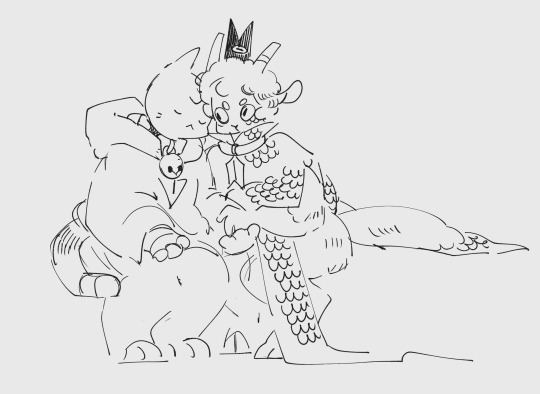
Yes, this is to some extent a reference to the Undertale. I haven't played it and I only know the base. Besides, I would like the game to give you more choice. Therefore, I have a Pacifist AU, where Lamb leads a very measured lifestyle and greatly admires Narinder, but decides to help him by forming an alliance with the bishops, and there is a Genocide path where Zlato kills everyone who gets in their way, and they hold their flock in iron hands. However, Zlato does this to free Narinder because they are obsessed with him.
some old doodles
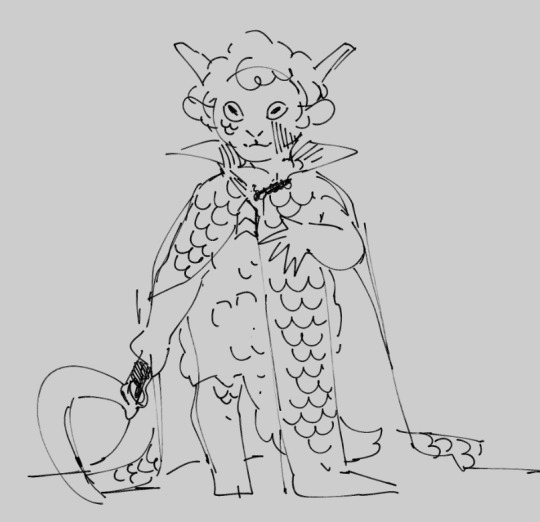
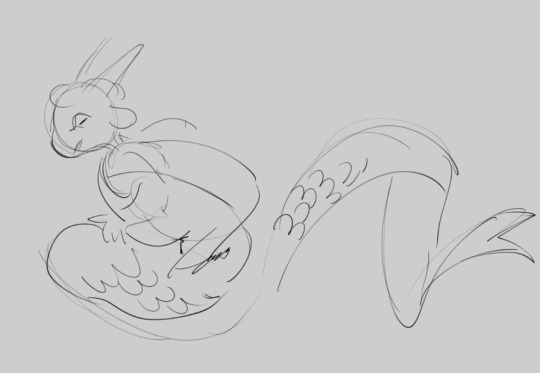
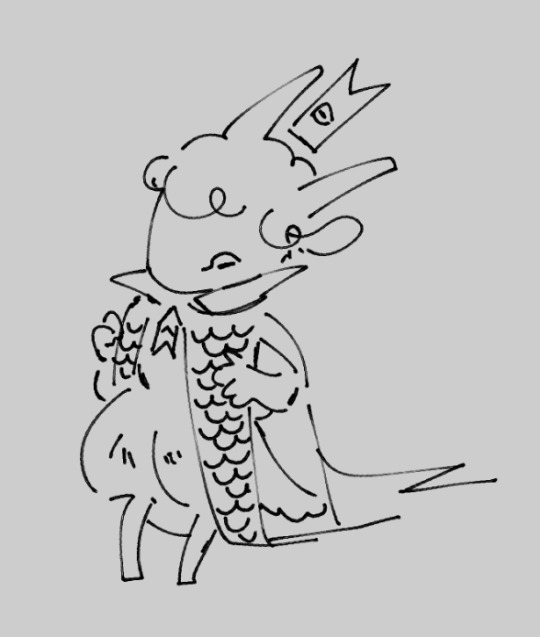
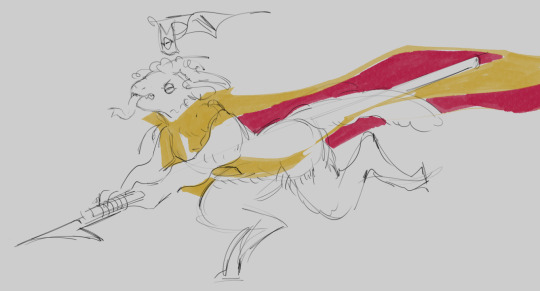
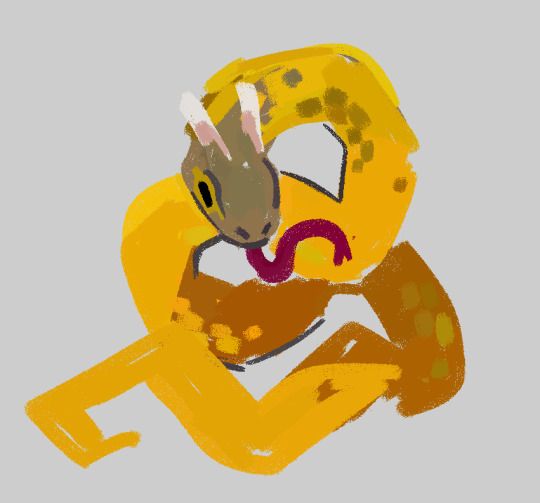
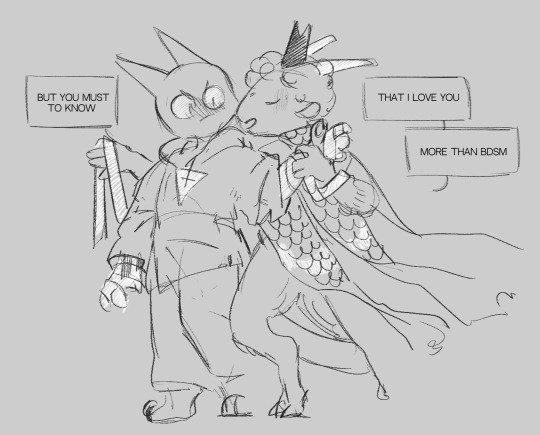
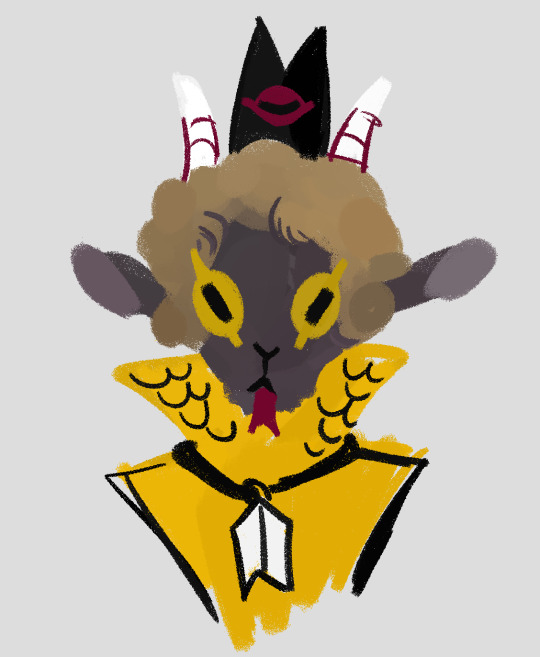
61 notes
·
View notes
Note
AMA question: Miranda, what is your favourite fairy tale? And do merfolk have stories that could be considered “fairy tales”?

[Transcript: Well, that depends on the criteria you wish to use! If we are speaking strictly, then we have none! These are all landfolk tropes, and we have no such thing as "fairies" in the folkloric sense.]

[Transcript: But there are some similar structures... Lots of stories deal with house spirits, and those who deal with the spirits to enact magic! Like purposefully insulting the whale animus to drive it off, and someone needing to charm it back! Lots of mythical hero-lines, but they mostly save villages or towns, not singular princesses... I am supposed to be a god-embodiment, but we rarely get saved... Or curses upon us, mostly we curse evil-doers at the end of stories. And the Atlantics have the ghost of their hero-era that gets slain...]

[Transcript: And, my favorite is the Lindworm Prince! It reminds me so much of our family-structure, and I like how it is the scaly one who is the princess!]
Since merfolk are so collectivist, most of their stories focus less upon individuals, and moreso upon communities or groups. There are very few stories about singular merfolk, but many about a specific group of merfolk who were one soul split into many, or multiple embodiments of different concepts, or one specific group of merfolk who were all blessed by a god or spirit, or one group who is all an incarnate of one god split into many bodies. These groups are the ones credited with different heroic tasks, with only some cultures placing importance upon who within those groups did what. These are usually meandering tales, detailing exactly how who knows who and in what way, made worse by how the antagonists of such stories are also mostly groups, sometimes of merfolk, oftentimes of monsters or spited spirits.
Likewise, the majority of merfolk religions are animist, placing souls within all animals and all plants, all the way down to inanimate objects, concepts, geography, and times. You might call upon a specific soul to enact a specific task, but these souls might also grow irritated or spiteful, even depressed, and will change and alter the behavior of their charge accordingly. Some religions also include a greater animus who preside over all of that kind of spirit, or they might include a "king" of those spirits, or even both at the same time. Sometimes "gods" might be a category of these spirits, but sometimes gods represent grander concepts or exist outside of these spirits, and gods usually can be split down into multiple different gods without breaking their central identity.
This has a high crossover with stories where they might use animals or concepts as a stand-in for merfolk, creating simpler parables and tales that are mostly to teach a moral or explain why something is.
The animals involved are explicitly understood to not be physical, moreso a metaphorical representation of a wider concept, but this also applies to other aspects of merfolk literature. They closest thing they have to the tropes of the princess, of the prince and hero, of the thief, of the king, would be the habit of reusing singular characters from established stories through time, and long extending out past the original story. However, these are much less literal than the human examples. They would not, for example, believe Robin Hood to be a singular person who has lived a remarkably long amount of time and done everything stated in the stories, but rather they would have a dual understanding of the character as both individual and multiple people operating under the same name, forming a gestural community and plurality that extends through time.
(Some merfolk will even explicitly take the name of these characters and believe themselves to be them, in a way that is deliberately calling to mind this temporal miivt'ia. Most other merfolk will believe them and honor this request, but there is still a risk of being disbelieved if they are seen as behaving "out of character.")
They also do not focus very heavily upon romantic relationships, nor view romantic relationships as anything particularly to achieve, only something that exists as a side effect from their existing relationship hierarchy. Very few stories end in any merfolk getting together, and usually it's a miivt'ia who was split apart, or a prophesied group of spirit-incarnate merfolk forming a miivt'ia to bring about blessings and gifts, or, at most, a ul'kiha forming and multiple people becoming one. Ul'kiha do not neatly map onto the idea of soulmates in the traditional sense, because all stories and myths of ul'kiha relationships treat them as one person with two bodies, the same as merfolk think of and are supposed to treat ul'kiha. It's seen as uncouth to treat them as different people, even before the relationship is formed, and the only exception will occur if the relationship ever ends, which always occur after the break happens and never before.
For this, their myths aren't very focused upon family lines, nor do they particularly care about parentage. What does occur is the repeated concept of a continual miivt'ia, kept alive by other merfolk joining it and those born into it remaining in it. How they join still matters, usually in debating if the spirit or god has lost favor with the existing members of the miivt'ia to no longer choose to incarnate into their bodies, and what it means to bring in someone who may upset the original balance of the miivt'ia.
In this sense, the Royal Family and their lineage has more in common with these, as they represent a mythical perpetually-incarnating miivt'ia blessed by a singular god or spirit, who has chosen them specifically and will not incarnate elsewhere, and it is up to them to service and enact the metaphysical will bestowed upon them. In stories, these usually form elite orders or secret groups, or royal families, and often they are used as a deus ex machina to save other characters and groups more than actual characters themselves.
#all the care guide says is 'biomass'#asks#fishyfishyfishtimes#monster prom#miranda vanderbilt#spec evo#speculative evolution#this is SO LATE but hi! character ama is still on! miri loves to hear herself talk!#art#digital art
22 notes
·
View notes
Text
Bluebeard
by Bruno de La Salle
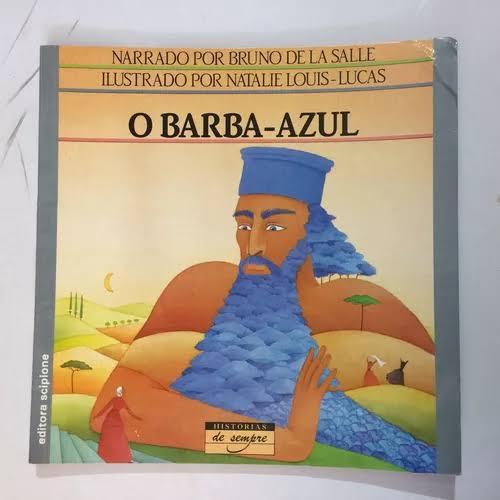
If you love fairy tales, you need a French friend. I read this version of Bluebeard when I was a child. It stuck with me, because in this version, there’s a dark, melancholic, and dream-like romance between the protagonist and the titular Bluebeard, here reimagined as a prince cursed into being a giant.
But I could never find this book again.
My good friend @adarkrainbow helped me find it and I will forever be thankful to him.
@ariel-seagull-wings , this is the Bluebeard I talked about. A Bluebeard tale that is also a mix between Beauty and the Beast and Prince Lindworm.
"Curse, curses, Spells, imprecations: Words of blood, words of lead."
There had been a curse and no one knew why, for whom or in what way. But what remained certain was that misfortune was there. There was, in this kingdom where neither king nor laws existed, a poor old man who had just lost his wife. And this poor man had lost, with his wife, his courage, his good humor and the last grain of brain that remained to him.
He had had three beautiful sons, they had been away at war for six years and would not return at the earliest after seven.
He had only his daughters left: four girls to marry, but who were not yet married and who every day asked what there would be to eat, knowing that there would be nothing.
He spent his days looking for what he could bring them back and did not find much.
One day, a winter day without bread, he suddenly saw in front of him a field covered with blue cabbages. Those cabbages that are put in soup and that are tender and crunchy. They seemed so numerous to him that it was like an ocean. But what surprised him most was that he had never seen such a field, in that place, before.
Without trying to find out more, he threw himself at this godsend. He wanted to pull out these cabbages to take them away as quickly as possible.
He could not pull out a single one. These cabbages were as if attached to the earth of this strange field. As if connected by threads. The poor man was overcome by a desperate anger. He began to hit the cabbages, kicking and punching.
He heard a rumbling, and suddenly saw a rock rise up above him and the field, an enormous stone. It was neither field nor stone! It was the head of a giant and the field was his chest on which his blue beard feel like cabbages.
The poor man wanted to run away but the giant had seized him with two of his enormous fingers. He brought him close to his face and asked him gently: What was he doing in that beard? Why had he disturbed him?
The poor man told everything: his misfortune, his misery, his four daughters to marry, feed and clothe.
“Give me one and you will never be hungry again. Otherwise, since you are disturbing me, I will crush you like a fly!”
The man did not hesitate much. Fear, misery, stupidity, the urgency of his decision did not help him to think. He accepted.
When the appointment was made, he quickly returned home, reassured and almost happy to have gotten rid of the danger, and also of his eldest daughter.
Without being heard by the others, he came to tell his daughter that a prince was in love with her, that she had to go see him near his castle as soon as possible, to come to an understanding and to marry him.
The girl did not argue. The opportunity was too good to miss, to leave such a poor father to find a powerful husband. She urged him to leave.
On their way, crossing a river, they came across washerwomen who were washing fine shirts that they were putting in baskets. The oldest of the washerwomen spoke to the girl:
“Help me carry this linen!”
The other did not look at her. She was not going to compromise such an attractive marriage to help such poor people!
When they arrived at the field, they found a drawbridge, in front of the bridge, a purse full of money and behind it, a large door that opened a crack.
The poor man pushed his daughter inside despite the terror she had, he pushed it and the door closed.
He waited but he did not hear a noise. That seemed enough to him to think that everything was fine. He took the purse and then returned home, very pleased with his good deal.
So his elder daughter disappeared and no one knew how, except him and the giant. He did not try to find out what had become of her. He worried about it the day he found his purse empty.
So he returned to the field. His blue beard waved under the winter sky. Very, very respectfully, he pulled on one of the curls that was shaped like a cabbage.
And, like the first time, the blue giant straightened up. The old man was terrified. He hesitated to ask for news of his elder daughter but what he wanted most was to ask for money.
He did not need to do so. It was the giant who asked:
“Give me your second daughter if you want to earn money and if you want to save your life!”
The old man asked for nothing else. He did not ask any questions. He did what he had done again.
And like her elder sister, the second was too happy to believe she had escaped misfortune.
She left with her father, did not listen to the washerwoman, ducked behind the door and was the father able to take the salary from this affair.
Ill-gotten money evaporates without one knowing how to do without it.
A third time, the father headed for the blue field. And as the previous times, things went well.
It was the last one's turn. The youngest, the innocent one, the one who wanted to stay home to watch over her father who was left alone since the others had left.
Everything had to be explained to her: the story of the older sisters and the giant, the choice he had left her: a daughter or to be killed.
She agreed to give herself up, but took a raven and a dove on her shoulder to send news: white and joyful news, black and dangerous news.
They met the washerwomen on the way.
The oldest asked her to help her carry the laundry. She came to help her immediately.
Then the old woman gave her three small colored handkerchiefs, the first white, the second red, the other blue:
-Take them for your wedding day, they are a shirt, a dress and a coat. And you will not take them off until your husband also takes off similar clothes.
The washerwoman returned to her shirts at the washhouse and the girl to her way.
They came to the gate. The father took his money. And the girl and her two birds went into the castle.
She enters the castle, the brave young girl and she is all amazed.
It is a magnificent palace, all lit up, all illuminated and so well made, so well arranged that it is as if she had always lived in this palace.
She crosses the lounges, the rooms, the apartments. She sees there, she recognizes there what she had guessed to see there, except that everything is blue.
The young girl arrives at the dining room, where the meal is prepared with everything she prefers.
The giant is there, suddenly, and invites her. They then sit down at the table. It is like her father told her during their journey: his skin, his beard, his hair are blue, pale blue like anger, like winter cabbages.
And yet, he seems less big, less big than a large stone and a field. But a terrible sadness can be read on his face, a heavy blue sadness.
When they have finished eating, he takes her to his room then withdraws without saying anything.
The next day, at dawn, he stands ready to lead her, to show her what he has.
He says:
“Everything belongs to you. Take whatever you want.”
But she looks and is silent, admires but does not dare say anything and it is he who must guess what she would like to ask.
The days pass thus, discovering themselves to each other, being silent and listening to each other, revealing themselves without saying anything.
She was no longer afraid of him, nor of his astonishing appearance. But as for him, the more time went by, the more he seemed worried. It was as if he had feared that a noise or a movement might shatter a hope she was unaware of.
She had asked him for news of her three sisters.
He had not invented any, he had said: They died because of their imprudence!
He had said nothing more.
In the evening, when they separated, all the lamps went out. And he had forbidden her to light a single candle before dawn the next day.
He joined her in the night and left her before daybreak. And if she had not known who he was and what he had probably done, she would have loved him very much.
Almost a year had passed. One morning, he came to find her, more serious and sadder than ever:
“I am going to go on a journey and you are going to be left alone. I leave you all my keys, the hundred keys to the house. Everything in it is for you. Go wherever you wish. Except to the lower room where I keep what belongs to me. I beg you not to go there, otherwise I am not responsible for anything.”
He tells her all this in a whisper and he leaves and she finds herself alone.
She does not hesitate for long. She knows that she must discover what this house hides.
She runs to the lower room and with the small key opens the unfortunate door.
A suffocating stench immediately takes hold of her by the throat.
She advances inside. She perceives, in the silence, the dull noise, the slow and brief noise of heavy drops that crash.
There is, in this darkness, a glowing light that escapes from a smoking fire. And this threatening glow reveals the brownish shadows that are suspended from the ceiling.
After a moment, she understands the giant's horrible secret: these shadows, these noises, this smell, are the blood, the flesh, the limbs and the remains of the wives who preceded her in this place and those of her elder sisters who were murdered and cut up.
She guesses almost everything that had happened: they had come here driven by curiosity. They had been betrayed by a secret, a magic. The giant thus warned had killed them immediately.
They had dropped this key which was magic. And this key had spoken to warn the murderer.
The young girl this time does not drop the key.
Among all the butchery, she recognizes her three sisters, their heads, their trunks, their limbs.
With tenderness, she gathers the pieces. And their bodies are reconstituted. And as if by magic breathe, but nevertheless remain asleep.
While she is at her work,She suddenly notices another door in the room. A very small door.
Curiosity takes hold of her. She wants to know what is behind this little door. She opens it and discovers a staircase. She goes down.
She arrives in a cave. A gigantic cavern, as big as the whole world, with a vault as vast as a starry night sky.
And under this sky unfolds a marvelous landscape, made of hills, rivers, mountains, fields and rocks.
But when the moon appears and illuminates the cavern, she understands what she sees: it was not a landscape, but the sleeping body of a man.
And under the moonlight, she recognizes the giant who sleeps almost peacefully.
In the middle of his chest, as vast as a valley, flows a white river.
And on the edges, washerwomen wash soiled linen, shirts stained with blood.
And each time a shirt is cleaned, the giant sighs and sobs.
And his complaints are so touching that the young girl forgets to hold the key, and lets it go.
As soon as it is no longer held, as soon as it is abandoned, the key swells, twists and screams, it screams and it warns:
“This woman has disobeyed! This woman has disobeyed!”
Then the washerwomen flee, the river stops flowing and the valley, on the giant's chest becomes a gaping wound again.
Then the giant wakes up, resumes his tormented form. His beard and his skin become pale blue like anger, like cabbages in winter.
He addresses the young girl:
“You did not know how to keep the key. This cursed fairy key that watches over me to keep me cursed. Because of you, I become again the one who only does evil, the one who separates and who kills, the one who cannot stop himself from killing so great is his fear and who will kill you too.”
He immediately seizes his ax and begins to sharpen it, while grinding between his teeth which excite his grindstone:
“Guise, guise, my grindstone! Guise my beautiful gray blade! Crips, criss for the betrothed! Guise, guise, I caught her disobeying me! Guise my beautiful gray blade! I'm going to cut her throat!”
She says to him:
“Listen to me! Since you are going to kill me, grant me a favor! I would like to become your wife before I die. I would like you to marry me before you kill me. And I want, for that moment, my bridal finery. Let me go and get dressed.”
The giant does not answer her, but while sharpening his ax, he signals her to go.
She runs out of the cave. Quickly climbs the stairs. Finds her sisters awake. Quickly tells them what to do:
Climb to the top of the tower. Open the raven's cage, so that it can fly away and warn their brothers who have returned from war. Watch, watch and watch, then warn when they arrive.
The three sisters climb the tower and make the raven fly away. The young girl is in her room. She unfolds the three handkerchiefs that the washerwoman had given her.
Then she undresses and takes the first white handkerchief. She puts it on her chest. It makes a shirt for her.
But down below the monster is busy:
“Guise, guise, my millstone! Guise my beautiful gray blade! Squeal, squeal for the betrothed! Guise, guise, I caught her disobeying me! Guise my beautiful gray blade! I'm going to cut her throat!”
And suddenly he gets impatient: “Is your finery on?”
And the young girl answers: “I can't find my chemise.”
Then she addresses her sisters:
“Don't you see anything coming?
And the three sisters answer her:
“We only see the paleness of the dawn that is about to arrive and nothing, and nothing on the way.”
But she, she looks for the handkerchief, the second little red handkerchief. She unfolds it on her body and it makes her a robe. And the giant shouts again:
“Guise, guise, my millstone! Guise my beautiful gray blade! Squeal, squeal for the betrothed! Guise, guise, I caught her disobeying me! Guise my beautiful gray blade! I'm going to cut her throat!”
And shouts even louder: “Is this chemise on?”
She answers: “It is on, but now I'm looking for my robe!”
Then she addresses her sisters:
“Don't you see anything coming?”
And the three sisters answered him:
“We see the sun coming, lighting up the horizon, but nothing, nothing on the path.”
She took the last handkerchief, the blue handkerchief, and placed it on her shoulders, and it made her a coat. A blue coat like the giant's beard.
The monster howled like a madman:
“Guise, guise, my millstone! Guise my beautiful gray blade! Squeal, squeal for the betrothed! Guise, guise, I caught her disobeying me! Guise my beautiful gray blade! I'm going to cut her throat! Is this dress finally on?”
“It's on properly. I can't find the coat!”
Then she addressed her sisters: “Don't you see anything coming?”
And the three sisters answered her:
“We only see the morning and the sad day that is coming. And then also three horsemen in the distance!”
But it is probably too late, because here is the giant coming up to look for her.
So she must resolve to go down to find him.
And he, when he sees her coming, dressed in her three handkerchiefs, he remains completely bewildered, so perfect is this finery.
He orders:
“Take off this coat!”
And she, without knowing why, answers:
“Take off a coat like this!!”
These words make him angry, even more than he was there, but he cannot refuse her what she has just asked.
With both hands, he takes his blue beard, pale blue like anger, like winter cabbages. He tears it off his face.
And all his giant skin, which was blue like his beard, he tears off his whole body. Then, she takes off his coat.
But under this skin of anger, which the giant had just lost, appears a red crust like the dried earth.
He asks:
“Take off your dress!”
She answers:
“Take off a dress like this!”
He tears off the two lips of his wound from his chest. And all the crust of earth that had covered him until then cracks and crumbles into dust. Then, she takes off her dress.
But under the layer of earth, which the giant had just lost, appears a skin of stone, like a white and pointed rock, a yoke of sharp stones.
He asks her in a breath:
“Take off your shirt now.”
She answers:
“Take off a shirt like this!”
The giant begins to tremble, to tremble from head to toe. Trembling so much that he makes the castle tremble. And suddenly, the rock breaks, the stones split, finally break.
Then the man emerges from his shell, old and young at the same time, full of strength, but exhausted, like a newborn in the hands of the one who gives birth to him. And she took off her shirt.
The three brothers had arrived. They had blown up the door and were running to the cavern. The three sisters accompanied them.
They arrived too late. The young girl had defeated the curse. She had freed the prince.
There was only a queen and a king left, happy to be free.
There were only sweet, tender and affectionate words.
Nothing more of the sinister past.
Nothing more of what had been feared, nothing more of what had been believed.
"Curse, curses, Spells, imprecations: Words of blood, words of lead."
It was all gone, like a dream.
Again, thanks for helping me find this gem again
@ariel-seagull-wings @the-blue-fairie @thealmightyemprex @tamisdava2 @princesssarisa @adarkrainbow @piterelizabethdevries @natache @theancientvaleofsoulmaking
26 notes
·
View notes
Text
still thinking about how one of the abilities of the monster that Laios created is shapeshifting. How the remains of his monster form looked like sloughed-off skins like he fucking prince lindwormed himself back into human shape.
Just, like it's fully possible that man could still technically be his fursona just stuck in the shape of a human because he needed to be human-shaped and able to think like a human in order to save his sister.
but also be fun as hell if he just looked like a normal human being. But he's got insatiable demon hunger. The offputting aura that scares off monsters. Plus the powers of his fursona that aren't related to the actual shape of its body like
Able to digest desires (fun potential horror hunger angle in addition to the literal can't feel full no matter what or how much he eats thing)
can make a forest from its poop (super fertilizer poop or shenanigans involving trees sprouting from the royal toilet)
Can change shape
Able to be the leader of a pack? (followed by groups of animals?)
Tough body that can't be damaged by magic (a surprise for a would be assassination plot)
Strong
I will assume that the flying, swimming, and moves about 300 km/h are structural things like not getting confused with the multiple heads
fucking wild if he retained the superstrength, mild invulnerability, soul-eating, and poop that makes incredible fertilizer - urgent maintenance needed for the royal toilet. Tree removal needed.
Laios having to reckon with his choices in character design after accidently ripping a door off the hinges or finding a pine going out of the toilet when he's really gotta go
'leader of a pack' gets followed around by groups of animals when it's not convenient. He just wanted to look at the sheep and now they won't leave him alone
50 notes
·
View notes
Text
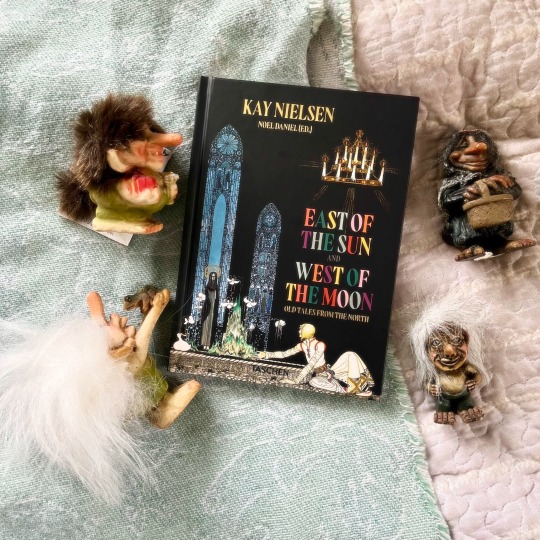
☀️ East of the Sun and West of the Moon: Old Tales from the North edited by Noel Daniel, illustrated by Kay Nielsen
Rating: ⭐️⭐️⭐️⭐️/5
A collection of Northern European folktales, taken and adapted from the original 1914 publication with art by one of the golden age illustrators- Kay Nielsen. These stories center around trolls, witches, lindworms, and magic.
This is such a lovely book that encompasses the beauty and fun of Norse/Scandinavian folktales. We’ve got classics like “Three Billy Goats Gruff” and some I hadn’t read before like “The Three Princesses of Blueland”. I liked how in the back of the book there was a note on the usage of some terms referring to Christians so, as a reader, I can understand it better.
My top three stories in this book were “East of the Sun and West of the Moon”, a total classic; “The Three Princess of Whiteland”; and “Prince Lindworm”. These stories, paired with Kay Nielsen’s famous art, were such a great combination of nostalgic storytelling. Obviously, some of the stories in this collection have some problematic themes common in many European fairytales, so I took some of it with a grain of salt.
The reason this book wasn’t Five Stars for me was only because about four of the stories became repetitive at the end and weren’t very engaging. I wish they had chosen some with differing themes and plots.
#godzilla reads#book blog#east of the sun west of the moon#kay nielsen#Norse folktales#book review#reading#booklr#bookworm#bookish
24 notes
·
View notes
Text
Gonna have two posts for today's AUtober prompt (fairytales) lol because this part of a potential Helen/Paris fic hit me today. So a snippet, the story it's based on is King/Prince Lindworm.
For being a giant snake, the drakon was beautiful. She - for it was a she - was a pure, gleaming white from the very tip of her blunt nose down to the pinky-thick, pointed end of her tail. Some of the scales were edged in what seemed like gold, for how flashed in the light, dazzling the eyes with a pattern only seen behind one's closed eyelids, or from the edge of one's vision. There was even a pearlescent shimmer to the white of her scales.
Though her middle was as thick about as that of an adult woman, she moved with the grace of a swan bending its neck this way and that, curving over the surface of the water as it swam. And whatever else one might say about her huge, unblinking eyes, they were not the livid yellow or dead black of most snakes, but a sparkling, soft gray, like morning mist lit by the rising sun.
"I'd be honoured," Paris said, throat thick, a cold chill keeping him captive, unable to follow his heart's hammering urge to flee - if he hadn't spoken, and drawn in the air needed to do so, he might have fainted. He just barely managed to keep from croaking his agreement - such as it was - out. "She's beautiful."
The king and queen stared.
Their son's eyebrows shot up high on his smooth forehead as he stared. The guards, still clutching their pikes and hilts of swords as if he might have the least bit chance to actually effect an escape if he should dare to try, stared. The small number of court functionaries and nobles present to gawk at yet another unfortunate young man being consigned to such a cruel death, stared too.
And the drakon, who had been staring out the windows across the throne room as if uncaring or unknowing of what was going on around her after she'd revealed herself, whipped her head around to stare.
#helen of sparta#paris of troy#helen and paris#autober#lightart#considering the magical conception of the tale#helen and polydeukes are the twins#instead of Helen and Klytemnestra#or Polydeukes and Kastor c:
9 notes
·
View notes
Text
Some Abnormality or Distortion ideas I have out of boredom
A Abnormality or Distortion based on a Nuckelavee
An Abnormality or Pair of Abnormalities that's a reference to The Prince Lindworm Fairy tale
A Religious based Distortion based on a Biblically accurate angel like a Cherubim or Seraphim
An Abnormality with concepts of Tea and Deal with the Devil
An Abnormality based on the Seele Fae or A Midnight Summer's Dream
A Distortion or Abnormality based on or inspired by the Loup-Garou
9 notes
·
View notes
Text
WIP Intro - Temperance & Mr. Wyrm.

Title: Temperance & Mr. Wyrm
Genre: Body horror, romance, magical realism, drama, historical fiction (1980s), fairytale/folklore retelling (Prince Lindworm), novella.
Status: Second draft/revisions
Themes: Shedding skins - literally and figuratively - to grow into a new person; temperance (in regards to self-restraint and suppression against impulses); survival and faithfulness of love.
Content Warnings: General body horror, snake imagery, ableist language regarding autism, general socio-political norms of the 1980s (though I will keep this to a minimum as I feel like I don’t need to stick 100% true to the period. However, given how illness and healing is the core plotline, the whole being “afraid of AIDs” will make a brief appearance).
Synopsis: Two people try to navigate their unorthodox romance in spite of an arcane, snake-like infection that affects one of them.
Temperance Cavell, a six-foot tall autistic woman living in Milwaukee, Wisconsin, lives a quiet, unexciting, and demure existence running a convenience store with her mother. But despite her mother's overbearing nature, the nonstop caring of her ailing grandmother, and her near-nonexistent social life, she cannot complain. This life is quiet, she’s (somewhat) in control, and nothing is unexpected…
That is until Jack Turner, the motorcycle-riding kleptomaniac with a heart of gold, bursts into her store one Saturday afternoon, and between them a romance reluctantly blooms. That is until such love is swiftly threatened to shatter when Jack’s body begins to betray him, contorting him into something that is completely, and utterly, non-human.
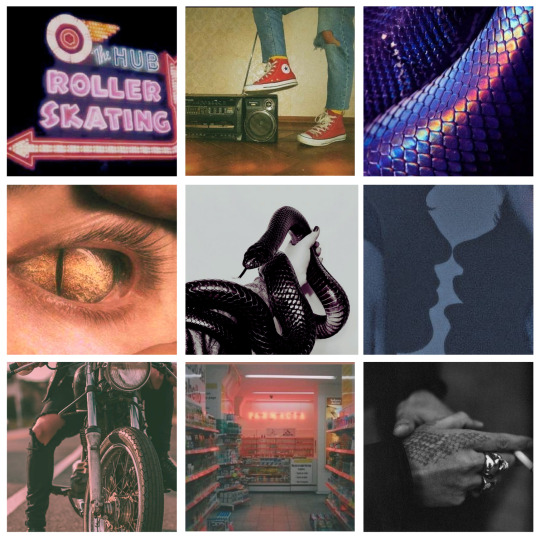
WIP Pinterest Board
***
would you still love me if i was a wyrm?
just a redo of this WIP intro for TAMW because the old one was slightly outdated and I wasn't a huge fan of it lmfao
The tag for this story is #WIP : temperance and mr. wyrm if you're interested in learning more about this story!
#WIP : temperance and mr. wyrm#wip intro#writeblr#writeblr wip#horror writer#writing community#writers community#writers on tumblr#looking for writeblrs#looking for writers#body horror#monster romance#creative writing#writeblr intro#writers#author#book writing#book in progress#novel writing#novel in progress#bookblr#authors of tumblr#Spotify
36 notes
·
View notes